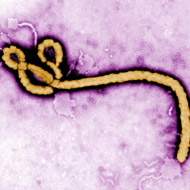
Identified shortly after Liberia declared free of the disease
A new suspected case of Ebola has been identified in Sierra Leone, just hours after Liberia was declared free of the disease.
The World Health Organisation (WHO) say that the event shows that strong surveillance and response systems will be critical in the months to come so as to prepare for possible flare-ups of the disease.
Yesterday's announcement that Liberia was free of Ebola came 42 days after the last confirmed patient in Liberia tested negative twice for the disease.
The announcement marked the first time since the start of the epidemic two years ago, that all three of those countries hardest hit - Guinea, Liberia and Sierra Leone - have reported zero cases for at least 42 days.
However, WHO cautioned that the three countries remain at high risk of small outbreaks of Ebola. To date, 10 such flare-ups have been identified that were not part of the original outbreak, and are likely the result of the virus persisting in survivors even after recovery.
“We are now at a critical period in the Ebola epidemic as we move from managing cases and patients to managing the residual risk of new infections,” said Dr Bruce Aylward, WHO’s special representative for the Ebola response.
“The risk of re-introduction of infection is diminishing as the virus gradually clears from the survivor population, but we still anticipate more flare-ups and must be prepared for them. A massive effort is underway to ensure robust prevention, surveillance and response capacity across all three countries by the end of March.”
Together with the Governments of Guinea, Liberia and Sierra Leone, WHO and partners are working to ensure that survivors have access to medical and psychosocial care and screening for persistent virus.
They are also providing counselling and education to help survivors reintegrate into everyday life, reduce stigma and minimise the risk of Ebola transmission.
Image (C) CDC Global.



 The latest
The latest